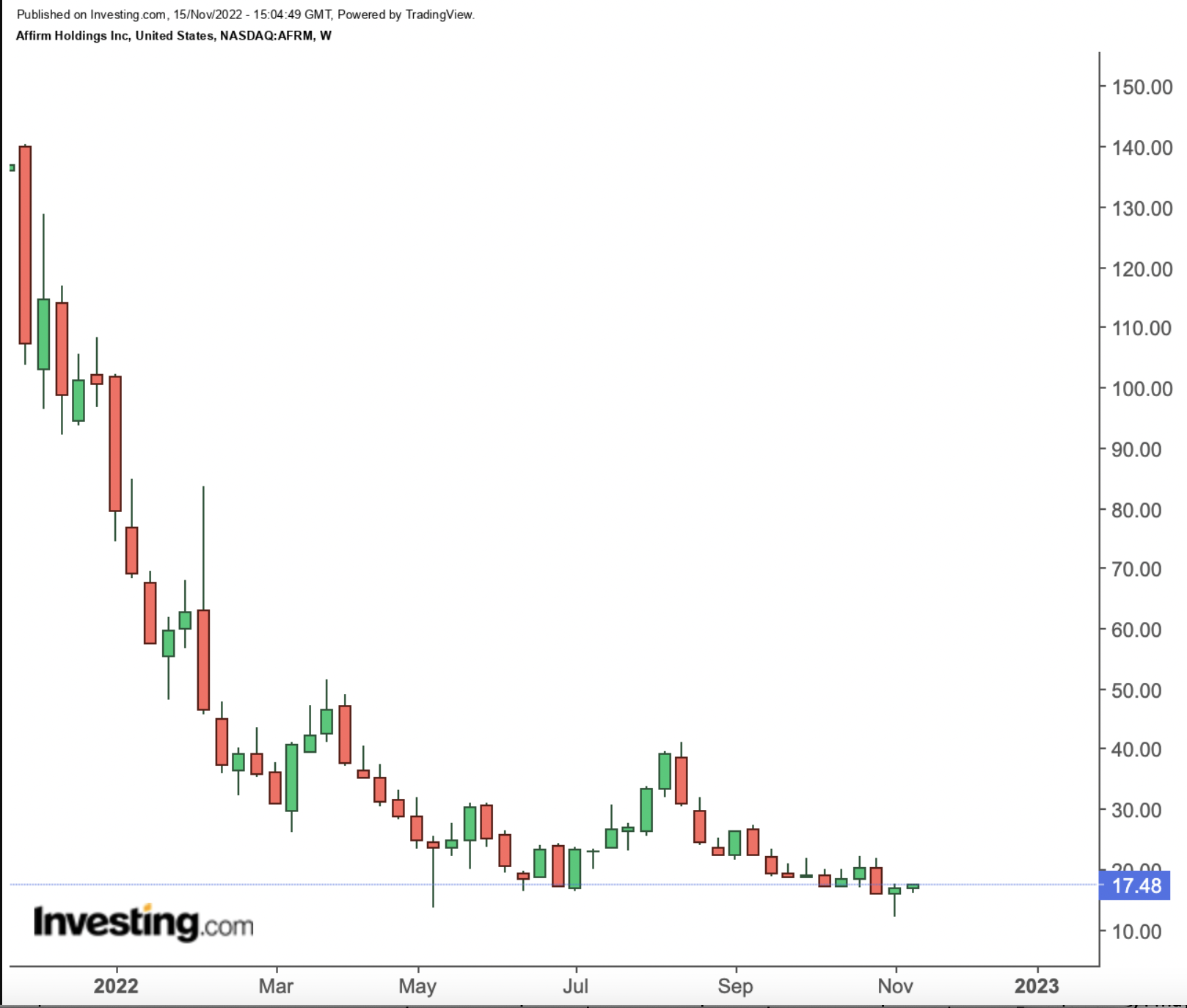Bill Gross warns on gold momentum as regional bank stocks tumble
- To bulls, Affirm is a company poised to disrupt the consumer-lending industry
- To bears, it’s simply a product of zero interest rates and an overheated equity market
- The truth is probably somewhere in between — but without profitability, it’s difficult to get too excited
Affirm Holdings (NASDAQ:AFRM) is one of the most interesting stocks in the market. Two reasonable, experienced investors could take a close look at the “buy now, pay later” provider — and come away with very different opinions. Indeed, the market as a whole seems to have had precisely that experience last week, with AFRM falling 22.6% last Wednesday after fiscal first-quarter earnings — and then gaining 23.9% the following session.

Source: Investing.com
One key reason for sharply divergent opinions is that we simply don’t know what the Affirm business model looks like in different macroeconomic environments. The company was only founded a decade ago. Affirm, thus, has never dealt with a prolonged period of high unemployment — or anything close to the current interest rate regime.
As a result, looking forward there’s a bit of a guessing game here. Is Affirm a true ‘disruptor’ in the financial industry? Or, is it just the latest in a long, long line of financial companies who claim to have found a better way to price risk? Most of those companies, eventually, come to find out that their models are not nearly as resilient as they believed. Their shareholders inevitably pay the price.
From here, the more likely answer is that Affirm simply was in the right place at the right time. Beyond management claims, there simply isn’t enough evidence here to suggest that the company indeed, has built a better financial mousetrap. Instead, Affirm, when fully understanding its accounting, is losing a substantial amount of money in an environment that on the whole should be in the company’s favor. That, in turn, gets to the key question here: If Affirm isn’t turning a profit now, when will it?
The Bull Case
In fiscal 2019 (ending June), Affirm generated Gross Merchandise Volume, or GMV, of $2.6 billion. (GMV is the total dollar volume that runs through the company’s platform in a given period.) For FY23, the company is guiding for GMV to exceed $20 billion.
Revenue should go from $264 million to $1.6 billion-plus. The company had 3,100 active merchants in FY19, and now has more than 200,000. A partnership with Shopify (NYSE:SHOP) admittedly inflated the total, but that aside, Affirm still has dramatically expanded its reach.
Bulls — and Affirm executives — would argue that the growth is being driven by strong execution. Yes, Affirm has had some external help from e-commerce growth. But the company at its core is creating a product that is showing success. Merchants partner with Affirm to expand the payment options available to their customers — and, thus, to make more sales. Consumers use Affirm services because they are preferable to credit cards or other financing options.
And so while the macroeconomic environment will have some short-term impact — indeed, Affirm lowered its full-year guidance after last week’s fiscal Q1 release — the long-term trend will remain firmly positive. If anything, as Chief Executive Officer Max Levchin argued on the Q1 earnings call, the more difficult external environment can help the company take increased market share.
An investor who believes this to almost any extent has to see AFRM as a screaming buy here. A market capitalization of $4 billion — and an enterprise value closer to $3 billion — implies a low probability of the company being a true disruptor. Yet, with revenue rising sixfold in four years, the results and the strategy suggest that it well might be. With so much room for growth from new geographies, penetration of offline spend and increased adoption, AFRM has at least a chance of posting massive upside from here. That’s a valuable trait to have.
The Bear Case
The bearish argument, however, is that the company is growing because it’s underpricing its product. Despite a couple of quarters of adjusted profitability in the past, Affirm is losing money.
Notably, it’s losing a lot of money. Updated guidance for FY23 doesn’t seem that bad. Affirm is looking for adjusted operating margins of –5.5% to –7.0%. Obviously, a loss is unwelcome, but this is still a fast-growing company: revenue should increase more than 30% this year, and roughly 40% excluding a plunge in volume from Peloton (NASDAQ:PTON), formerly a major customer.
But that guidance excludes share-based compensation, which is substantial. In Q1, Affirm booked $120 million in such expenses. At the rate over a full year, equity comp would account for more than one-quarter of revenue. Even simply looking at the company’s guidance for shares outstanding, nearly 16 million shares are being added to the count this year. That’s roughly $240 million in value, or about 15% of guided revenue.
Adjusted for dilution, then, Affirm is losing more than 20 cents for each dollar in revenue — at least. And that assumes this year’s guidance is hit, after several reductions in recent quarters.
Importantly, it also assumes that the market environment doesn’t get that much worse. As the company’s own chief financial officer said in March, it’s employment, not necessarily inflation, that matters for credit quality. Higher interest rates already are pressuring revenue by raising funding costs (which are netted out of reported revenue); increased unemployment would amplify that problem by increasing loss provisions as well.
With delinquencies already at pre-pandemic levels, there’s not a ton of slack in the model here. Either Affirm reduces its risk, in which case GMV falls and revenue falls. Or, it faces higher losses, in which case revenue falls and profit margins deteriorate further.
It’s possible this bear case is too bearish, and too focused on the near term. It’s possible Affirm simply has a better decisioning model and a better business model. The good news — and the risk — for AFRM shareholders is that the company is going to have to prove its worth in the coming quarters.
Disclaimer: As of this writing, Vince Martin has no positions in any securities mentioned.
